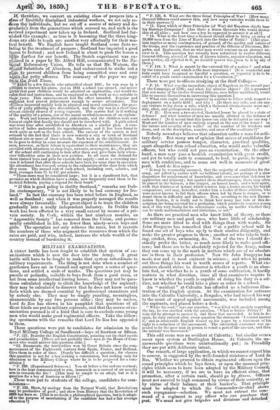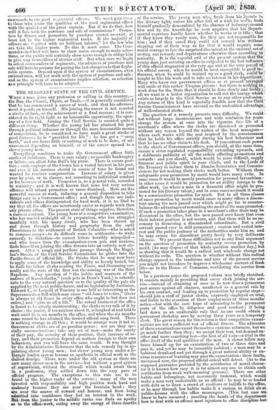MILITARY EXAMINATIONS.
A GREAT battle has been fought to establish that system of ex- aminations which is now the door into the Army, A great battle will have to be fought to make that system subordinate to military requirements. The thing is not done when a number of gentlemen have sat in Council and agreed upon a series of ques- tions, and settled a scale of marks. The questions put may be puerile or pedantic, suitable to boys fresh from a good cram, or hot from some intellectual forcing house. They may not be ques- tions calculated simply to elicit the knowledge of the aspirant; they may be calculated to discover that he does not know certain facts which are deemed essential by professional examiners and by nobody else. They may be simply puzzling, meaningless, unanswerable by any two persons alike ; they may be useless. Lord de ,Ros has shown in his pamphlet that questions of all these kinds are put to military aspirants, and that the course of ex- amination pursued is of a kind that is sure to exclude some young men who would make good regimental officers. Take the follow- ing specimens with the remarks that Lord De Res has appended to them.
These questions were put to candidates for admission to the Royal Military College at Sandhurst—boys of fourteen or fifteen.
"P. 221. Describe the English Constitution, pointing out its chief merits and peculiarities. [There are not probably three men in the House of Com-
mons who would answer this question alike.] * • *
"12. Enumerate the territorities won by Great Britain since the com- mencement of the Eighteenth century from Spain, France, and Holland. Give them in order of time. [Surely too difficult a question; for observe this question is not for a boy seeking a commission, but seeking only for admission to the Military College where he is to be prepared for a com- mission.] • • "P. 2119. (Experienced Sciences.) You sit before a fire and are warmed; how is the heat communicated to you, inasmuch as a current of air usually sets in towards the fire ? [This may be simple to an adept, but is it a question for a boy of fourteen or fifteen ?]" These were put to students of the college, candidates for com- missions— " P. 126. Show, by analogy from the Natural World, that Revolutions may be productive of good ; and show from.History that the Revolution of 1688 has been so. [This is no doubt a philosophical question, but is it adapt- ed to the purpose of ascertaining if the candidate has had a fair average education ?]
" P. 126. 8. What are the three Great Principles of War ? [How many General Officers could answer this, and how many varieties would there be in their answers • • • • " 11. Upon which of three Principles (of War) did Napoleon chiefly base his Marengo Campaign ? [Are there a dozen Generals who would answer • this at all alike ; and how can a boy be expected to answer it at all?]
" 14. What is the least time a General should allow to bring an army of 30,000 men from the Line of March into the Order of Battle ? [This' ques- ' tion implies so many contingencies, of ground, of the quality and nature of the troops, and the experience and practice of the Officers of Divisions, Bri- gades, and Regiments, that no wise man would venture on an abstract an- swer to it. This question has actually been submitted to twelve different General Officers, several of them of known talents, superior education, and good service, all objected to it, no decided answer was given to it by any of
them.] • •
-" P. 144. 1. What is meant by the external life of a nation ? and what by the internal ? and which is the most important ? at is wonderful any body could have imagined so fanciful a question, or regarded it fit to be asked of a youth under examination for a Commission.]"
These were put to officers studying at the Staff College--
" P. 15. What was the immediate object of Napoleon in the second part of the Campaign of 1796; and what his ulterior object ? [It is presumed that not many of the twelve General Officers, once before mentioned, would like to commit themselves to answering this question.] " What rule ought an army superior in number to follow with respect to deployment on a battle field ; and why ? [Is there any rule, and can any t
one venture to lay down a rule, which a thousand circumstances must mo-, reverse.] y, alter, and perhaps even revee.] • , •
P. 21. flow may a two-storied, thatched house be placed in a state of defence ? and what number of men are usually allotted to the defence of each story ? [Is it meant that this house can only be defended iu one way ? - Must not the number of men entirely depend on the size of the house ? on , the nature and security of its walls ? on the number of its windows and , doors, and on the description, number, and arins of the assailants ?]" Nobody nowadays believes that education unfits a man for mili- tary duty. But many are of opinion that scores of candidates for military service possess temper, character, practical qualities, apart altogether from school education, who would make valuable officers, but who could not pass an examination. On tho other' hand, a man may pass a bookish examination with great oredit, and yet be totally unfit to command, to lead, to guide, to inspire' men with confidence, and to come out well in moments of great peril. Lord de Ros says- " It may be reasonably assumed, that the majority of candidates for the army, are gifted by nature with no brilliant talents, are perhaps of a slow disposition for acquirement of knowledge, and even somewhat deficient in application and industry ; but against these disadvantages, there may often be placed in the balance, a fine temper, an honest heart, and a bold spirit, with that kindness of nature which renders him a leader among his boyish companions, and may, hereafter, render him a leader of those soldiers, who were never known to fail their officers when led by them to danger, or to
desert them in di culty and disaster. Now, according to the new kxami-, nation System, it is really sad to think how many fine lads of this de- -
scription are being rejected for a profession, which positively requires young. men of this very stamp for its subordinate ranks, no matter whether they., can be made mathematicians and historians, or not." As there are practical men who know little of theory, so there: are military men and good ones, who have little of scholarship.. Some are more fitted to deal with things than with words. Sir, John Burgoyne has remarked that " at a public school will be found one set of boys who apely to their studies diligently, and make the greater progress in them ; another set who take to bo'at- ing cricket, fives, swimming, &c. Now of the two I should de- cidedly prefer the latter, as much more likely to make good offi-' cers; but these are to be absolutely rejected for the Army, unless. they can come up to the mark in matters which are of no absolute- use to them in their profession." Now Sir John Burgoyne has made war and is most eminent in science • and when he points. out these things his word is worth scores of reports. What ex- aminers should strive to discover is whether a youth is an abso lute fool, or whether he is a youth of some cultivation, it hardly matters in what direction, since all that examiners require to know is whether the youth is capable of doing his duty as a sol-, dier, not whether he could take a place as usher in a school.
An " accident" at Calcutta has afforded us a ludicrous illus- tration of the English system. At the examination for entrance into the Calcutta University, a Bengalee, who had missed his way to the court of appeal against assessments, was included among the aspirants, and placed before a desk.
" While his soul," says our reporter, " was filled with anxiety regarding the tax, he was startled with the question, What is Satiric Poetry ? ' In vain did he attempt to answer it, and those that succeeded. At last in de- spair, he duly entered after every question the statement I cannot answer. it,' and in intolerable English wound up his paper by a statement of bis right to a reduction of the assessment. The astonished examiner was ap- pealed to by the poor man in person to remit a part of the ameunt, and then the mistake was discovered."
This odd scene was an accident at Calcutta ; but similar scenes occur upon system at Burlington House. At Calcutta the un- answerable questions were unintentionally put ; in Piccadilly they are put with deliberate intent.
One remark, of large application, in i caton, n whch we cannot expect him .
to concur, is suggested by the well-founded strictures of Lord de Ros. Whether we proceed to obtain regiinental officers upon the sound principles which he lays down, or upon the unsound prin- ciples which seem to have been adopted by the Military Council,' it will be necessary, if we are to have an efficient army, that promotion, after a certain rank, should go by fitness. Officers must not succeed to high command by virtue of their seniority? or by virtue of their balance at their banker's. That principle. must be adopted to which' the Commander-in-chief shows such repugnance—selection. We must not entrust the com-: mend of a regiment to any officer who can purchase that' post. We must not give brigades and divisions and detached. commands to the good regimental officers. We must give them to those who unite the qualities of the good regimental officer with the qualities of the great captain. But if we do that, how will it fare with the purchase and sale of commissions ? Promo- tion by fitness and promotion by purchase cannot co-exist, at least not in the higher regimental ranks. If the majority of officers are " gifted with no brilliant talents," let the few who are take the higher posts. To this it must come. The Com- mander-in-Chief will have to show nerve enough to make selec- tions, or the public will certainly show nerve enough to oblige him to give way to an officer of sterner stuff. But when once we begin to select commanders of regiments, the admirers of purchase and sale will have to prepare for paying the last obsequies to that deplo- rable system. Depend upon it the system of examinations, even rational ones, will not work with the system of purchase and sale ; and as the system of examinations implies selection, so selection as a principle will have to be adopted. commands



























 Previous page
Previous page